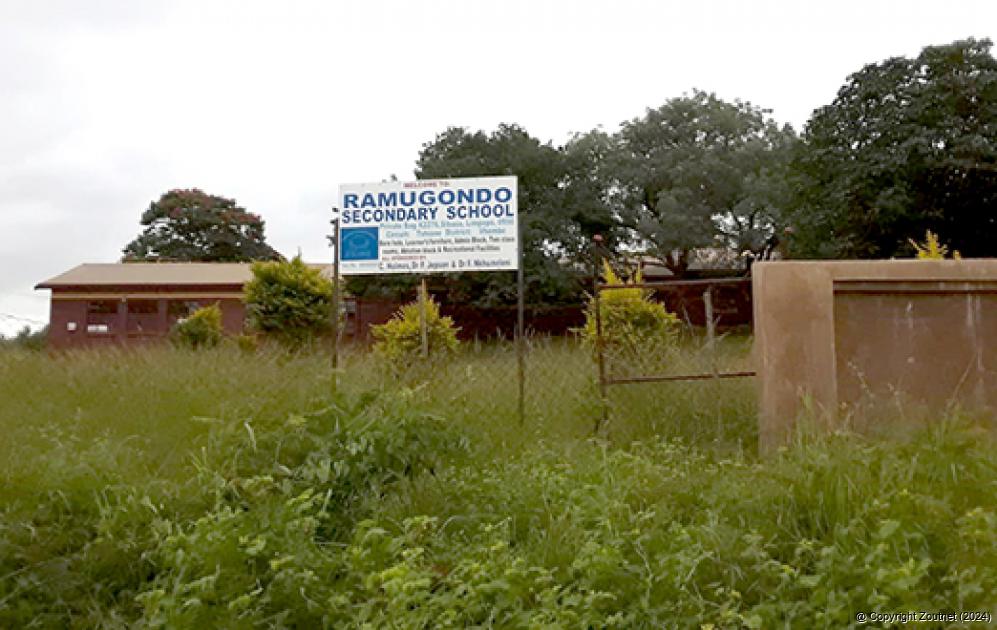

ADVERTISEMENT:

Ramugondo Secondary School (pictured) was merged with Muhuyu wa Thomba Secondary School in Tshitereke village because the former did not meet the departmental minimum requirement of 200 registered pupils
School closure forces pupils to walk 30km
Pupils and educators at Ngudza village near Sibasa are now forced to travel 30km to and from a school in the neighbouring village, following the closure of Ramugondo Secondary School.
The Department of Education opted to close Ramugondo Secondary School and merge it with Muhuyu wa Thomba Secondary School in Tshitereke village, because the former did not meet the departmental minimum requirement of 200 registered pupils in the school. The school had only 128 pupils.
The representative of the affected community, Mr Ramugondo, said that they had received notice on 28 February from the Department of Education's office in Makwarela. “Our children have now been transferred to Muhuyu wa Thomba Secondary School in Tshitereke village, which is almost 15km away from our village,” he said. “These children will now have to travel a total of roughly 30km per day.”
Ramugondo made it clear that he understood why the department needed to close such small schools, but the problem was that the department did not want to offer any assistance in terms of transport. “We tried all avenues for them to provide transport to the affected children, but they couldn't promise anything,” he said.
Last week, the pupils started walking to and from Tshitereke village for school, because the parents could not afford transport fees. Ramugondo said that most of the parents were dependent on child grants and old-age pensions, so they had no means of paying a transport fee.
“I am also worried that these learners will be using dangerous routes – which include a bushy route that crosses the Tshinane River and the Mutshundudi River when going to Tshitereke village,” he said. “It might be difficult for some learners to cross the river during the rainy season. I am also afraid of the risk related to criminal activities that might happen to these affected learners.”
Ramugondo said he had contacted the provincial Department of Education's offices, who said that they were unable to assist with transport. “They said whoever closed the school should have made sure that all arrangements such as for transport, additional tables and chairs were in place before transferring learners to a new school,” he said. “This was quite indicative that the Makwarela office had closed the school without sending a report to the department and getting a directive to close the school from the top office. This is odd.”
The Department of Education's spokesperson, Mr Sam Makondo, said that the department had not said that whoever had closed the school should have made sure that all arrangements were in place.
“The application for scholar transport is at an advanced stage as we speak,” he said. “We had held a meeting with the parents, and they said that they were willing to transport their own children to school in the meantime. The scholar transport application is receiving attention and is being processed in terms of the supply chain processes of government. They qualify for scholar transport and they will be catered for,” he said.
News - Date: 13 March 2020

Recent Articles
-

Bekende akademikus verloor stryd teen kanker
26 April 2024 By Andries van Zyl -

Former mayor of Tshwane, Dr Murunwa Makwarela, passes away
26 April 2024 By Victor Mukwevho -

Community relieved after suspect gets caught
26 April 2024 By Elmon Tshikhudo -

Ystervrou van die Bosveld oorlede
26 April 2024 By Pétria de Vaal
Search for a story:

ADVERTISEMENT


Tshifhiwa Mukwevho
Tshifhiwa Given Mukwevho was born in 1984 in Madombidzha village, not far from Louis Trichardt in the Limpopo Province. After submitting articles for roughly a year for Limpopo Mirror's youth supplement, Makoya, he started writing for the main newspaper. He is a prolific writer who published his first book, titled A Traumatic Revenge in 2011. It focusses on life on the street and how to survive amidst poverty. His second book titled The Violent Gestures of Life was published in 2014.
Email: [email protected]

ADVERTISEMENT:

